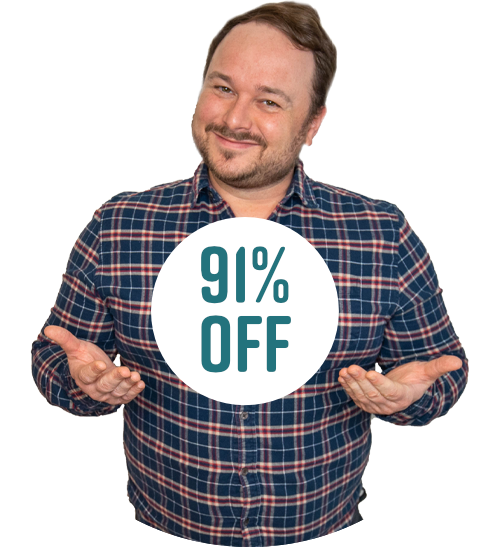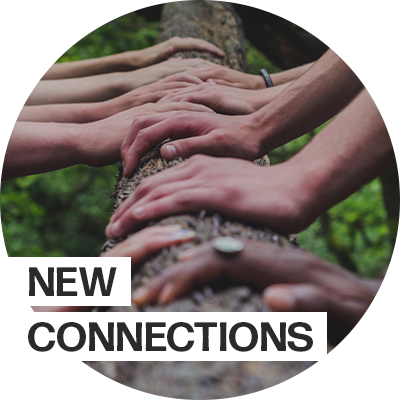7 Common Language Learning Strategies That Don’t Work (And How to Fix Them)
Here’s a common scenario: you decide to learn a language and tell your all friends and family your plans.
Then they tell you about the “best” way to learn a second language (even though they don’t speak any other languages themselves).
“Take a class!”, says one person.
“Get a degree in the language”, suggests another.
“Just watch a ton of movies”, chimes in a third.
Those all sound like great strategies, so you pick one and gleefully dive in.
Fast forward three weeks (or three years) and you’re barely able to form a sentence. Fed up, you give up learning a language.
That is, until you pick it up again with a new strategy.
With each new strategy you try, the same thing happens. In the end, you give up completely.
Here’s the thing: most common language learning strategies don’t work because they ignore the most important rule of language learning: you can’t just study a language — you have to use it.
Today I’ll explain why some of the most popular language learning strategies don’t work, and how to adjust your approach to quickly level up your language skills.
Strategy #1: Take an Academic Style Language Class
Classrooms are not the best place to learn languages. Spending most of the time listening passively to someone talk at you about the language (often in your native tongue!) with very little speaking on your part is a poor use of your time.
The number of students graduating with 5+ years of classroom instruction in a language who still can’t hold a conversation shows that classroom learning is not the best way to spend your time or money.
The Language Hacker’s Fix: Accountability
If you still have to take a class (such as for your college course), here are some ways to take the slow process of classroom learning and speed things up for rapid language acquisition.
Get accountability outside the classroom. The most common argument in favour of language classes is that it is too difficult to study effectively on your own. And while classes can be great for forcing you into a programme of study and accountability, I would argue that you can get the same thing from your network of friends, or a programme like the Add1Challenge.
Supplement your classroom time with an equal amount of time actually speaking the language. You can find tons of native speakers in dozens of languages over at Preply (our review is here), a marketplace for online language tutors and teachers. One hour of time spent with a native speaker talking in the language and reviewing what you learn in the classroom is always more effective than several hours of self-study at the school library.
Use SRS (Spaced Repetition Systems) and mnemonic memory aids to quickly memorise new vocabulary. SRS (Spaced Repetition Systems) and mnemonics can help you learn new words much faster than most of your classmates. With all the extra time you gain by not using rote memorisation you can focus on the most important part of language learning: speaking!
Strategy 2: Consider studying Linguistics in School
Linguistics is all about picking apart languages and discovering how they work. If a language is a car, then linguistics is looking inside the engine.
Many language learners believe that knowing a language’s rules means you will be able to use them. It’s a strange belief since it often doesn’t apply in other areas. If you knew all the rules of kickboxing would you feel confident getting in the ring? I hope not!
I’ve written before about the difference between linguists and polyglots but it basically boils down to knowledge vs. skill. Many linguists don’t actually speak more than one language so aren’t in a position to help you develop language acquisition skills. While linguistics is fascinating, it is not actually related to helping you directly use a language.
The Language Hacker’s Fix: Get Real World Practice
If you have dedicated yourself to the study of the structure of languages I tip my hat to you. But it isn’t the same as being able to communicate in the language.
Understand that studying and speaking are different. The best way transition from a “language student” to a “language speaker” is to change your focus from book learning to “mouth using”.
To avoid mixing the two together, divide your focus and think of each one as a completely separate subject.
Imagine working during the day as a radio DJ, and also being passionate about playing the guitar. They are both related to music, but from very different perspectives. Studying linguistics should never be a substitute for practising your target language.
Strategy 3: Watch Movies and TV Shows
Watching movies or television shows as a way to “passively” learn a language sounds like a language learner’s dream. That is, until you actually try it.
Passive language acquisition is one of those myths that preys on the lazy “couch beast” inside each of us that tries to get something without putting forth any effort. Learning a language takes work. As I’ve said before, you just can’t become fluent by passively listening to a language.
Movies and TV shows can help, but not if you plant yourself in front of a screen for eight hours a day. You’re no more likely to learn a language doing this than you are to become a pilot by watching aeroplanes. You just need the right approach and mindset.
The Language Hacker’s Fix: Act Out Your Favourite Movies
I’ve previously written about how to effectively use movies to study a language. In it, I share techniques on how to effectively use movies to provide a boost to your language learning projects.
Here are some of the key ideas:
Don’t just watch the movie. Study it. Viewing a movie for entertainment means you aren’t focused on learning the language. Treat the movie like you would a textbook, and study the material.
Break things up into consumable, repeatable segments. A two hour movie is too much language to absorb at once. Break it up into segments of 10 minutes or less, and review them multiple times until you have really learned something of substance.
Engage with the material. A movie is an open book on body language, accents, inflection, pronunciation and many other areas of language learning. Don’t just sit on your hands! Get involved in the story, act out parts, repeat lines and body movements and make the language come alive!
Strategy 4: Listen to Songs in the Language
As with movies and television shows, listening to music is often seen as a magic path to learning a language. The problem is that songs are written poetically so they aren't usually a good source for everyday grammar and vocabulary.
Listening to songs does have it’s place in a language learning mission — as long as you have the right approach.
The Language Hacker’s Fix: Sing Along
Instead of repeating myself, I’ll just recommend that you do the same as you would for movies or television shows: study the music (don’t listen passively), repeat segments (to really understand the material) and engage with the song (don’t just listen — sing!).
One additional fix is to recognise that song lyrics often take creative license with a language, so while they are helpful to your studies, keep in mind that it is the equivalent to studying poetry.
Strategy 5: Use the Rosetta Stone/Pimsleur/DuoLingo System
Popular language learning systems like DuoLingo and Pimsleur do have some positive benefits. DuoLingo gamifies language learning, which is good in principle. Pimsleur’s system helps with getting certain phrases down through audio training. Rosetta Stone is… sorry, I can’t think of any redeeming features… Yellow. Yes, it does yellow incredibly well!
But any system you buy is going to have one major disadvantage that you can’t escape: they aren’t tailored to you and your life. Most of the words and expressions you’ll use won’t be useful in your own life, and this lowers the effectiveness of these programmes.
The Language Hacker’s Fix: Choose What Works For You
If you are going to use these systems (perhaps they were given to you as a birthday gift), there are three recommendations to help you make the most of each.
Read my reviews of each system. Be sure to check out reviews of the Rosetta Stone system the Pimsleur approach to language learning, and the Duolingo language learning app to provide you with a big picture pro’s and con’s view of each.
Supplement with personalised materials. As you go through each system, develop your own list of personalised vocabulary and phrases. If the topic of the lesson is “shopping”, then write out a list of 20 items that you shop for on a regular basis yourself and add those to your flashcard deck. This allows you to use the sentence structures and grammar you’re learning with relevant vocabulary.
Plug up the holes in their materials. Each system has deficiencies, so fill in the blank spaces with your own efforts. For example, If the system doesn’t include a lot of speaking, then be sure to converse with native speakers. Or if the system doesn’t provide much listening practice, find listening materials online.
Strategy 6: Translate a Book Until You Learn the Language
Back when I started my first new language – Spanish – I sat down with a copy of El señor de los anillos (The Lord of the Rings) figuring that if I forced myself to read it with my dictionary in hand then for sure I would be fluent by the time I was done.
It took me an entire week to get to page 2!
This method might seem logical, but it’s completely impractical. It takes a huge amount of time. You’ll also be limited to the specific language style of the author which may make you sound strange to native speakers.
Can you learn a language from a book? Absolutely! But only with the right approach.
The Language Hacker’s Fix: Young Adult Fiction
Books should be a supplement to a language study program, not the core of it. And, just like movies, television and music, you have to change your mentality from entertainment to education.
I recommend selecting a book that you have access to in your native language so you can compare them side by side. Young adult novels (think: Harry Potter) work really well for this because the language used isn’t too stylised and the vocabulary won’t be too advanced.
Ways to use a book in your language study program
Here are my suggestions on using a book to learn a language:
- Tackle the book in segments, such as paragraph by paragraph.
- Get the book in your native language so you can get the gist of each segment before reading on.
- Preview the foreign language version to see how much you can understand without studying the text.
- Select any words you don’t know which appear multiple times and add them to your SRS flashcard deck.
- Read the passage to your tutor to work on your pronunciation and accent
- Record a native speaker saying the passage in both regular speed and slowly. Alternatively, pick up the audiobook.
- Review the passage multiple times. First, make sure you understand what’s being said. Then practice pronouncing it.
If you spend several hours on each segment of the book you will find your comprehension and use of the language improve quickly.
Strategy 7: Only Interact with Other Language Learners
If you’re in a class, or have friends who are also learning a language, you might think getting together to practice the language will build your skills. After all, isn’t it important to speak as much as possible?
Meeting up with other learners to practice your speaking can be really helpful. The problem is, they're unlikely to stretch you beyond your current level of speaking. To really accelerate your learning, you must interact with native speakers.
The Language Hacker’s Fix: Practise With Native Speakers
The best person to speak to when learning a new language is a native speaker of that language. You are exposed to subtle nuances in how the language is used that you may not otherwise realise. It is truly invaluable.
If you don’t know any native speakers in your area, then use the power of the internet to find a tutor on Preply (our review is here), on Teacher AI, through local meetups, couchsurfing. There are so many great ways to find native speakers online that you really have no excuse.
The Only Approach That Doesn’t Work is the One You Give Up On
As you can see, any approach can work, if given the right “language hacker’s” nudge. The biggest mistake I see language learners make isn’t a specific approach, but in not being flexible in their approach.
Constantly evaluate your language learning strategy and think outside the box to adapt them to your best advantage.
Don’t like your language class? What can you do outside of that room to improve your chances?
Studying linguistics isn’t helping you communicate? Supplement with time speaking the language.
Finding movies, music or books ineffective? Break them down and narrow the focus of your study.
Talking to the wrong people? Look for ways to find them on the internet.
You have the power to turn your approach around and gain fluency. So hack that language learning approach and level up your language!









Social